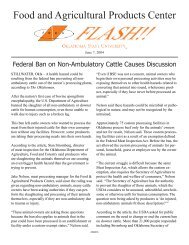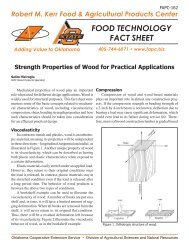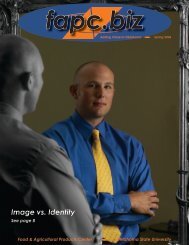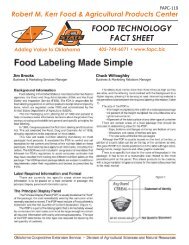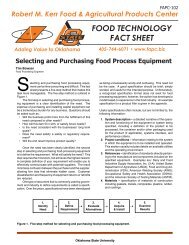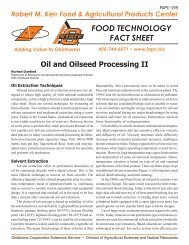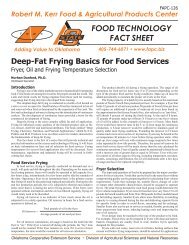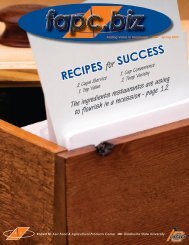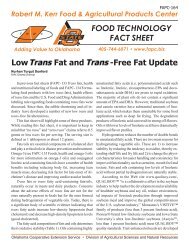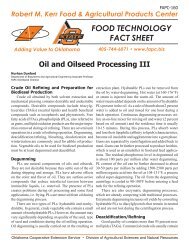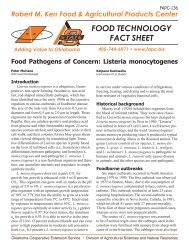Spring/Summer 2010 - Robert M. Kerr Food & Agricultural Products ...
Spring/Summer 2010 - Robert M. Kerr Food & Agricultural Products ...
Spring/Summer 2010 - Robert M. Kerr Food & Agricultural Products ...
You also want an ePaper? Increase the reach of your titles
YUMPU automatically turns print PDFs into web optimized ePapers that Google loves.
<strong>Food</strong> Industry<br />
arious necessities such as<br />
food, water, and energy affect<br />
our daily lives, and the<br />
way we live. Far too many people are<br />
removed from direct contact with the<br />
production and distribution of these<br />
daily necessities, and do not understand<br />
the manufacturing processes.<br />
They take for granted the ease of food,<br />
water, and natural resource consumption.<br />
The United States has the most<br />
abundant, easily accessible, and safest<br />
food supply in the world. Americans<br />
also are fortunate to have an abundant<br />
supply of energy and potable water.<br />
Many think the cost of water and energy<br />
is too expensive, but if you realize<br />
these are not evenly distributed by<br />
nature, but by man, it makes the cost<br />
more easily understood. We, as a nation,<br />
have been blessed with wonderful<br />
natural resources.<br />
However, the food industry has<br />
not been so blessed. The increasing<br />
cost of following the rules and regulations<br />
of the United States Department<br />
of Agriculture, <strong>Food</strong> Safety and Inspection<br />
Service, and the Environmental<br />
Protection Agency or Department<br />
of Environmental Quality has drained<br />
8 | fapc.biz<br />
the pocketbooks of small- to mediumsized<br />
food processors.<br />
We must meet certain standards<br />
in our daily operations of production,<br />
distribution, and storage of goods. The<br />
non-meat products also must meet<br />
certain standards, including water. The<br />
government also expects us to educate<br />
the American consumer on food safety.<br />
It is a large problem for meat processors.<br />
Once the product leaves the<br />
facility, whether to the ultimate consumer,<br />
grocery store, restaurant, or any<br />
other customer, the processor has no<br />
control over how the product is treated<br />
and if it is kept safe. We should not be<br />
expected to follow the customer home<br />
and watch over their household food<br />
supply.<br />
These changes keep growing like a snowball going<br />
downhill without a bottom and keep getting bigger<br />
and rolling faster.<br />
I have been associated with the<br />
meat and livestock industry for more<br />
than fifty years. Changes have always<br />
been a part of meat processing; however,<br />
changes have been coming at a<br />
greater speed and in greater numbers<br />
the last ten to fifteen years. The changes<br />
are like a snowball rolling downhill;<br />
they just keep growing. The problem<br />
is this particular hill has no bottom.<br />
Therefore, this giant snowball is going<br />
to keep getting bigger and faster.<br />
USDA and FSIS<br />
Being a small meat processor,<br />
many of the mandated government<br />
policies for food safety are not necessarily<br />
hard to overcome, but can be<br />
very expensive. I am not against food<br />
safety, but a firm believer. However,<br />
many avenues the government is using<br />
to enforce food safety are expensive,<br />
and I think redundant.<br />
On the horizon for meat processors<br />
is Validation of Processes. Validation<br />
is the process of proving your<br />
Critical Control Points, or CCP, of<br />
your Hazard Analysis of Critical Control<br />
Points, or HACCP, plan is valid<br />
and true.<br />
To do this, plants will need to<br />
retain meat scientists on staff or hire<br />
an outside company to validate all<br />
HACCP plans the company uses. This<br />
“idea” is directly opposite to currently<br />
accepted HACCP practices.<br />
At the present time, we can use<br />
proven scientific studies from government<br />
research facilities to validate our<br />
HACCP processes.<br />
For example, it has been proven<br />
many times by the scientific community,<br />
the lethality stage for Escherichia<br />
coli O157:H7 is 160 degrees Fahrenheit.<br />
However, according to government<br />
policy, this may not be a valid<br />
CCP in my HACCP program, and I<br />
may need to hire an outside company<br />
to validate this process.<br />
Small establishments do not have<br />
the capital and resources to initiate a



